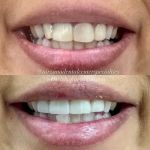- 1-Causes-of-Tooth-Pain-When-Biting-Food
- 2-Dental-Conditions-Leading-to-Biting-Pain
- 3-Sensitivity-and-Other-Contributing-Factors
- 4-Real-Life-Case-Studies
- 5-Effective-Diagnosis-and-Treatment-Options
1. Causes of Tooth Pain When Biting Food
Tooth pain triggered by biting down on food is a common dental complaint that can disrupt daily life. This discomfort often signals underlying dental problems that require attention. Understanding the root causes is essential for effective relief and prevention.
One primary reason for this pain is damage to the tooth’s internal structure or the surrounding tissues. When pressure from biting food transmits to sensitive areas inside the tooth or the supporting gums, pain arises. It’s important to distinguish whether this pain occurs only with biting or if it persists continuously, as this can point to different underlying issues.
Additionally, tooth pain when biting is often connected to the presence of cavities, cracked teeth, gum disease, or infections. Each of these conditions affects the tooth’s ability to handle the pressure from chewing, causing sharp or throbbing pain.
1.1 Pressure on the Tooth's Nerve
The most sensitive part of a tooth is the pulp, where the nerves and blood vessels reside. If this area becomes inflamed or infected, even gentle pressure from biting food can trigger intense pain. This inflammation, known as pulpitis, is commonly caused by untreated cavities or trauma to the tooth.
1.2 Structural Damage
Cracks or fractures in the tooth can allow bacteria to infiltrate deeper layers, leading to sensitivity and pain. Sometimes, the crack is so fine that it is invisible to the naked eye, but biting pressure reveals the problem.
2. Dental Conditions Leading to Biting Pain
Several specific dental conditions commonly cause pain when biting. Understanding these can help in seeking appropriate treatment:
2.1 Tooth Decay and Cavities
Cavities weaken the tooth structure and expose nerves to stimuli such as temperature changes or pressure from chewing. As decay progresses, biting on affected teeth can cause sharp pain.
2.2 Gum Disease (Periodontitis)
Advanced gum disease can loosen the tooth’s support, making biting painful due to increased tooth mobility and inflammation of surrounding tissues.
2.3 Abscessed Tooth
An abscess is a pocket of infection that forms at the root of a tooth or between the tooth and gum. This condition causes severe pain, especially when biting or chewing, and usually requires urgent dental treatment.
2.4 Tooth Fractures and Cracks
Teeth can develop vertical or horizontal cracks from trauma or grinding. These cracks create a “trap” for food particles and bacteria, triggering discomfort on biting.
3. Sensitivity and Other Contributing Factors
Besides structural and infectious causes, tooth sensitivity can also cause pain when biting food. This sensitivity often results from enamel erosion or gum recession, exposing the underlying dentin.
3.1 Enamel Erosion
Repeated exposure to acidic foods, beverages, or brushing too hard can erode the enamel layer, reducing protection and increasing sensitivity to pressure and temperature.
3.2 Bruxism (Teeth Grinding)
Grinding teeth can cause micro-fractures and wear down enamel, resulting in increased pain when pressure is applied during chewing.
3.3 Improper Dental Work
Sometimes poorly fitted crowns, fillings, or dental restorations can create uneven bite forces, leading to discomfort or pain while biting.
4. Real-Life Case Studies
Consider the case of Sarah, a 34-year-old who began experiencing sharp tooth pain only when eating hard foods like apples or nuts. After visiting a dentist at Dentistry Toothtruth, she was diagnosed with a hairline crack in one molar caused by years of teeth grinding. Treatment involved a custom mouthguard and a dental crown, which resolved her biting pain completely.
Another example is Michael, a 47-year-old with chronic gum disease that caused tooth mobility and pain when chewing. Through professional cleaning and gum therapy recommended by Dentistry Toothtruth, his symptoms significantly improved, restoring comfort during meals.
These examples illustrate how accurate diagnosis and tailored treatment can relieve tooth pain when biting food and improve quality of life.
5. Effective Diagnosis and Treatment Options
Diagnosing the exact cause of tooth pain when biting involves a thorough dental exam, including X-rays and possibly bite tests. Identifying whether pain stems from decay, infection, or structural damage guides the treatment approach.
5.1 Dental Fillings and Crowns
For cavities or cracks, restorative treatments such as fillings or crowns protect the tooth and alleviate pain.
5.2 Root Canal Therapy
When the pulp is infected or inflamed, root canal treatment can remove the infection and save the tooth, eliminating pain triggered by biting.
5.3 Gum Disease Management
Treatment of periodontitis through professional cleanings and sometimes surgery restores gum health and reduces biting discomfort.
5.4 Addressing Tooth Sensitivity
Specialized toothpaste, fluoride treatments, and avoiding acidic foods can reduce sensitivity and prevent pain on biting.
If you experience persistent tooth pain when biting food, it is crucial to consult dental professionals who can provide personalized care. Dentistry Toothtruth offers a wide range of services and products tailored to resolve these issues effectively and restore your dental comfort.







 Cherry Valley Dental4.0 (115 review)
Cherry Valley Dental4.0 (115 review) Main Street Dental Group and Orthodontics4.0 (238 review)
Main Street Dental Group and Orthodontics4.0 (238 review) Mountainside Dental Group - Rancho Santa Margarita4.0 (117 review)
Mountainside Dental Group - Rancho Santa Margarita4.0 (117 review) Shahin Shamsian DDS2.0 (17 review)
Shahin Shamsian DDS2.0 (17 review) Gannett Drive Dental4.0 (63 review)
Gannett Drive Dental4.0 (63 review) Daniel Jeffrey Cohen, DDS5.0 (117 review)
Daniel Jeffrey Cohen, DDS5.0 (117 review) The Importance of Oral Health Education During Pregnancy for a Healthy Pregnancy
The Importance of Oral Health Education During Pregnancy for a Healthy Pregnancy Best Tips for Brushing Your Teeth Properly for Healthy Gums: Essential Techniques for Oral Health
Best Tips for Brushing Your Teeth Properly for Healthy Gums: Essential Techniques for Oral Health Why Skipping Dental Checkups Can Lead to Bigger Oral Health Problems
Why Skipping Dental Checkups Can Lead to Bigger Oral Health Problems Advantages of Porcelain Dental Restorations
Advantages of Porcelain Dental Restorations How Can Diabetes Cause Tooth and Gum Problems? Preventing and Managing Oral Health Issues
How Can Diabetes Cause Tooth and Gum Problems? Preventing and Managing Oral Health Issues Healthy Habits for Promoting Good Oral Health and Hygiene: Tips for a Healthy Smile
Healthy Habits for Promoting Good Oral Health and Hygiene: Tips for a Healthy Smile